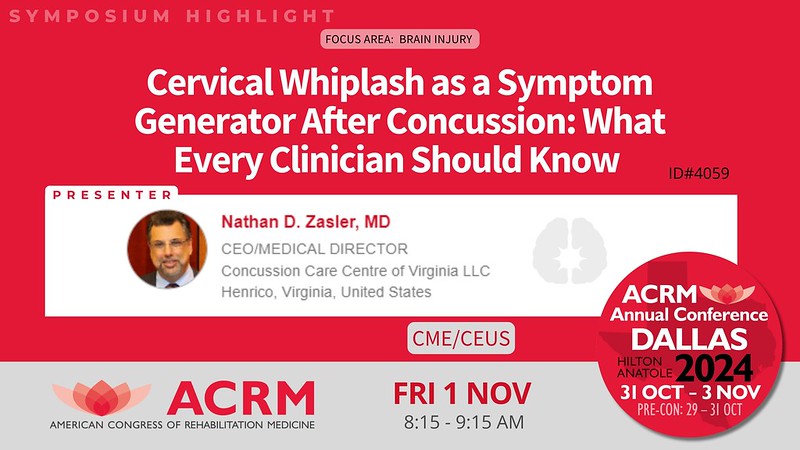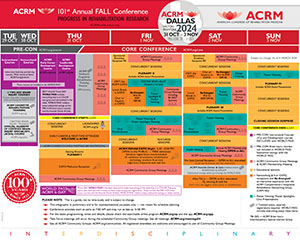Not registered yet? Register and SAVE 20% use code "finaldays20" at checkout. DETAILS: ACRM.org/finaldays20
QUESTIONS? --> meetings@ACRM.org
Symposium
Brain Injury
Cervical Whiplash as a Symptom Generator After Concussion: What Every Clinician Should Know 4059
Friday, November 1, 2024
8:15 AM - 9:15 AM
Location: ROOM: Coronado C REGION: Tower Lobby Level >>> DIRECTIONS: From ACRM Registration desk, face the elephants and turn right. Proceed past the lobby elevators and turn right to enter the West Wing. Proceed down the corridor, turn right and then left. Proceed past the restrooms. Coronado C is the second room on the right.

Nathan D. Zasler, MD
CEO/MEDICAL DIRECTOR
Concussion Care Centre of Virginia LLC
Henrico, Virginia, United States
Corresponding Presenter(s)
There is an extremely high cooccurrence of cervical acceleration deceleration (whiplash) injury in persons with concussive brain injury. These are often comorbid conditions must be differentiated in terms of the impairments associated with each. Oftentimes in clinical practice, the neck exam and consequences of neck injury are given inadequate attribution. In that context this presentation will review the history of cervical whiplash injury, its epidemiology, biomechanics and pathoanatomy as well as prognosis. The confounds associated with comorbid neck injury in patients with concussion will be addressed relative to the frequent occurrence of neck injury generating postconcussive type symptomatology that must be differentiated from true postconcussive impairments. In the context of this discussion, the presenter will also discuss some of the controversies associated with upper cervical spine instability as a source of different types of "postconcussive" symptoms.


Learning Objectives:
- Upon completion of this course, attendees will be able to explain the history, basic science, biomechanics and pathophysiology of cervical acceleration deceleration injury/whiplash
- Upon completion of this course, attendees will be able to identify the biomechanics associated with concussive brain injury relative to cervical whiplash and forces necessary for same
- Upon completion of this course, attendees will be able to identify the symptom overlap between concussion and cervical whiplash injury
- Upon completion of this course, attendees will be able to describe proposed mechanisms for postconcussive type symptoms following whiplash injury
- Upon completion of this course attendees will be able to explain the role of upper cervical instability in the generation of postconcussive type symptomatology
Disclosure(s):
Nathan D. Zasler, MD: Concussion care center of Virginia: Employment (full or part time) (Ongoing)

.jpg)
.jpg)
.jpg)
